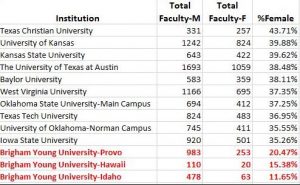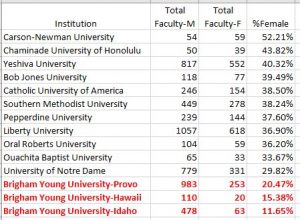
Michael Austin, a university administrator in the Midwest, and a blogger both here and at By Common Consent, has written a fascinating post at BCC, Not Even Close: Faculty Gender Balance at the BYUs. My wife and I spent all morning reading the post and the comments, including from lots of people with experience at the BYUs. The discussion includes not only the issues of low hiring of females at the BYUs, but also the structural and cultural barriers to Mormon women achieving success in high status tenure-like academic positions (women are hired at lower-status adjunct positions in high numbers).
Looking at the BYU-Provo English department faculty page, I count 34 males and 11 females who are listed as “professors” of some type, or 24.4%. So, a little bit higher than at the university in general (20.5%), but still relatively low. Today one male BYU-P English faculty member said in a comment, “We think about this all the time in our department. We’re actively mentoring and encouraging young women scholars to continue on to graduate school.” So hopefully it is improving.

Looking at the ranks of authors, there are far more Mormon female novelists than males. Women are active writing creative non-fiction at Segullah and other online sites. Yet they are still underrepresented at the BYU English departments. I am interested in people’s thoughts about the dynamics of gender among Mormon academics.

This post is assuming that professors at BYU are engaging with Mormon literature, which generally they are not and are somewhat discouraged from doing so. That’s a discussion for another day, and probably related to gender issues (maybe?), but sadly the English department at BYU is not the place to find scholarship about Mormons.
That has been true lately, hopefully it is changing. I understand the desire not to be provincial, to show that you are interacting with the larger world of culture. But I hope that they can find a balance between addressing the wider world and addressing their home culture. BYU faculty from all three campuses have been very helpful with judging categories for the AML awards the last couple of years, and doing book reviews of Mormon literature for Dialogue.
Joey Franklin, in the interview on this blog a couple of days ago, said, “I just reviewed Mary Lythgoe Bradford’s Mr. Mustard Plaster and Other Mormon Essays for Dialogue, and that collection of essays has had me thinking about this question a ton. In a nutshell, as a personal essayist, you cannot escape your culture. You can’t pretend it doesn’t exist. Not if you want to be truly authentic. I’ve always been a little concerned about being labeled a “Mormon Writer,” but that’s exactly what I am, whether I make a point of it or not. I love the texture that comes from Brian Doyle’s Catholicism or Dinty W. Moore’s Buddhism. Terry Tempest Williams writes with such intimacy about her Mormon heritage. I am interested in writing about my life, and as my faith has shaped my life experience from the day I was born, to not include it would be disingenuous, and maybe even a little cowardly.”
So, hopefully we are seeing the start of some balance correction.
I’ll extend it further by citing the gender imbalance among contributors at both this site and A Motley Vision. despite my own efforts at recruitment. The data pool is far too small to permit conclusions, but if I had to summarize my experience, it is that Mormon literary women are (if anything) even more busy than the men, with even more competing priorities.